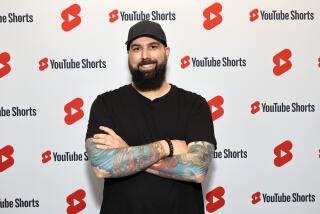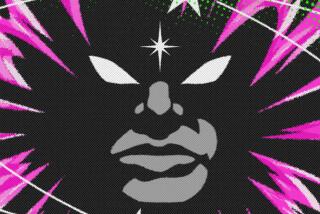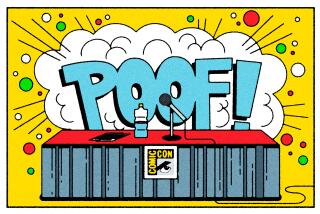Big boys enter the Web-comic arena
- Share via
DC Comics’ big announcement this week at Comic-Con was the launch of its new website, Zudacomics.com, which will be run by the comic book giant, but here’s the kicker: All comics running on the free site will be chosen by readers from among amateur submissions. “We’re investing in the future,” says Ron Perazza, DC’s director of creative services, explaining that DC is looking for new talent, trying to build new properties and reach new readers.
DC is certainly not the first outfit to bring comics to the Web. Marvel has flirted with the Internet in the past, and fans of the “Heroes” television series can find brief, episode-bridging comics on NBC’s website. But the first pioneers of the genre weren’t the big businesses that are now trying to get onboard, either -- they were the amateurs.
For the record:
12:00 a.m. July 30, 2007 For The Record
Los Angeles Times Monday July 30, 2007 Home Edition Main News Part A Page 2 National Desk 2 inches; 30 words Type of Material: Correction
Web comics: An article in Saturday’s Calendar section about artists whose work originates on the Internet misspelled the reporter’s last name as Hiltzig. The article was written by Andrew Hiltzik.
After all, Web-comics are the product of the freedom of the Internet: Authors don’t have to compromise their art (or, often, their coarse language) to appease a publisher, and the comics are often aimed at a devoted, niche audience. They rely on word-of-mouth to gain new fans, to an extent that would not be possible in print. For most Web-comic authors, the strip is more of a hobby than a vocation. Most have day jobs, which help them pay the hosting fees for the sites they run in their free time. The lucky ones can sell ads or accumulate a readership dedicated enough to provide donations. The really lucky ones are the handful that can actually make a living.
One of the most successful is “Penny Arcade,” written by Jerry Holkins and drawn by Mike Krahulik. The two men and the site’s small staff are supported by revenue from ad sales, merchandise, an annual gaming convention and an annual charity event. The strip features two young men called Gabe and Tycho, who spend their time playing video games.
The strip began in 1998 as a submission to a cartoon contest in “Next Generation,” a gaming magazine. When they didn’t receive letters of either acceptance or rejection, the pair kept sending in comics until the magazine told them, in so many words, to cut it out. Krahulik and Holkins shopped the strip around to different websites until LooneyGames bought it and started asking for more.
That property was bought in 2000 by eFront, a content aggregation site that later went under in the dot-com crash. When eFront failed, Krahulik and Holkins were given back the rights to their comic. For a while they scraped by on meager earnings -- at one point they lived for a year on donations from readers alone -- until they met Robert Khoo, a fan who offered to build them a successful business model.
Ryan Sohmer also started as a simple Web-comic author. His strip “Least I Could Do” revolves around Rayne Summers, a charming but juvenile twentysomething whose friends all play the straight man to his antics. This strip was the beginning of Sohmer’s career, but he has since branched out in a way that no other Web-comic author has: He started a production company.
By comparison, Jeph Jacques lives off his strip alone. He has no production company, no franchise and his business manager is his girlfriend. He estimates that 90% of his revenue comes from merchandise. Jacques’ strip is called “Questionable Content,” a name picked more for its unusualness than for its descriptiveness. (It also plays ironically on the fact that there is very little content in the strip that could actually be considered questionable.) The strip follows Marten Reed, who lives with his friend Faye, a barista at the coffee shop owned by Marten’s girlfriend, Dora. Like “Penny Arcade,” it started off directed at a very niche audience -- in this case, indie music fans -- but has since broadened to become a more story- and character-driven strip.
But these celebrities of Web-comics are far more the exception than the rule, and most of the authors interviewed for this piece expressed a uniform skepticism toward DC’s new venture.
To the independent Web-comic authors, it seems as if working for a big company like DC almost defeats the purpose of a Web-comic.
Krahulik pointed out a line on Zuda’s flier which stated that DC will retain the copyrights of all properties. “The best advice I can give to someone starting out in Web-comics is to maintain control of your property,” he says. “You shouldn’t get into Web-comics to make money.”
More to Read
The biggest entertainment stories
Get our big stories about Hollywood, film, television, music, arts, culture and more right in your inbox as soon as they publish.
You may occasionally receive promotional content from the Los Angeles Times.










